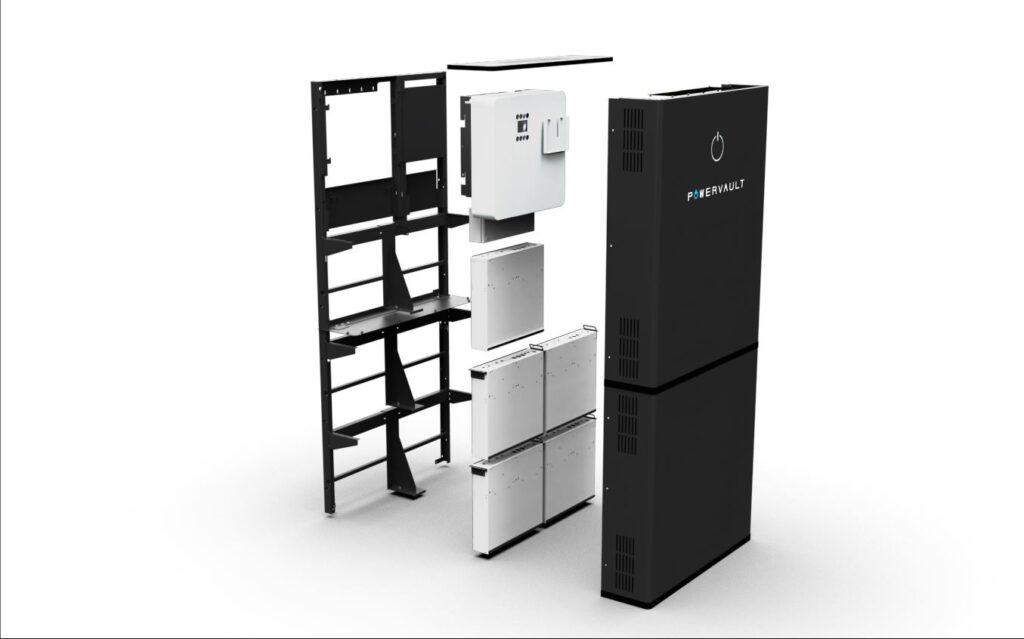
InsightPowervault explainer: Exploring AC and DC Coupled Solar Batteries
Introduction
As the demand for solar energy continues to rise, so too does the variety of solar battery systems available to consumers. Among the options, AC and DC coupled solar batteries have emerged as popular choices, each offering unique benefits and considerations. With Powervault’s recent introduction of a hybrid system that combines the best of both worlds, the decision-making process for consumers has become much easier. In this article, we’ll delve into the differences between AC and DC coupled solar batteries, explore the advantages of Powervault’s hybrid system, and help you make an informed choice for your energy needs.
AC Coupled Solar Batteries
- AC coupled solar batteries are connected to the alternating current (AC) side of the solar PV system, typically between the inverter and the main electrical panel.
- These systems offer flexibility in battery selection and sizing, as they can be retrofitted to existing solar installations without requiring modifications to the PV array.
- AC coupled systems are well-suited for grid-tied solar installations, allowing users to store excess solar energy for later use or export surplus energy to the grid.
DC Coupled Solar Batteries
- DC coupled solar batteries are integrated into the direct current (DC) side of the solar PV system, usually between the solar panels and the inverter.
- These systems are more efficient in terms of energy conversion, as they minimise losses associated with AC/DC conversion.
- DC coupled systems are particularly beneficial for off-grid or hybrid solar installations, where maximising energy efficiency and minimising system losses are paramount.
Powervault's Hybrid System
- Powervault’s hybrid system combines the best features of both AC and DC coupled solar batteries, offering consumers and installers maximium flexibility and and cost efficiency.
- By integrating both AC and DC coupled components, Powervault’s hybrid system enables seamless integration with a wide range of solar PV systems, regardless of their configuration or setup.
- Users can enjoy the benefits of AC coupling, such as easy retrofitting and compatibility with grid-tied systems, or harness the efficiency gains of DC coupling for optimal energy performance, depending on their solar setup.
Advantages of Powervault's Hybrid System
- Flexibility: Powervault’s hybrid system offers unparalleled flexibility, allowing users to tailor their energy storage solution to meet their specific needs and preferences.
- Cost efficiency: By combining AC and DC coupled components, Powervault’s hybrid system removes the need for a separate solar inverter, saving cost during initial installation.
- Compatibility: Whether you have an existing solar installation or are planning a new one, Powervault’s hybrid system is compatible with a wide range of configurations and setups, ensuring seamless integration and operation.
Conclusion
When it comes to choosing a solar battery system, the decision between AC and DC coupling is no longer binary, thanks to Powervault’s hybrid system. By offering the best of both worlds, Powervault empowers consumers to enjoy the flexibility, efficiency, and compatibility they need to harness the full potential of solar energy storage. Whether you prioritise ease of installation, energy efficiency, or system compatibility, Powervault’s hybrid system provides the power of choice to meet your unique energy needs.
Read more...Recent insight
Energy insight in your inbox
Subscribe to Powervault’s email newsletter and be the first to hear about new products, plus get all the latest news, analysis and insight from Powervault.


